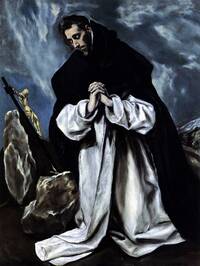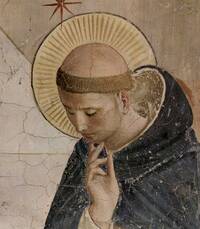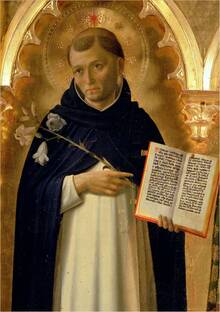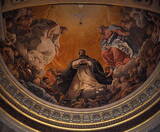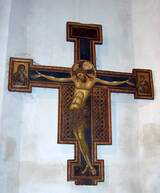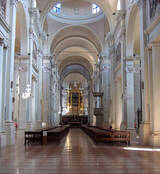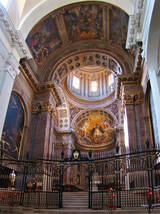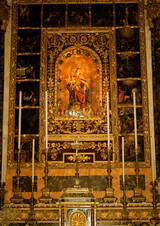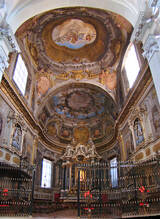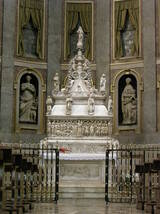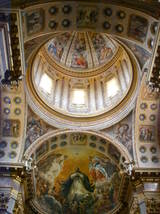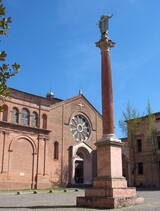Saint Dominic - Santo Domingo de Guzmán
Priest, Founder of the Dominicans (Order of Preachers) - from Spain
Introduced the prayer of the rosary.
Born on 8 August 1170 in Calaruega
Died on 6 August 1221 in Bologna
Canonized by Pope Gregory IX in 1234.
Patron Saint of astronomers & the Dominican Republic.
Feast day - 8th August.
Major shrine - Basilica of San Domenico, Bologna, where he is buried.
Benedict XV wrote an encyclical on St Dominic, Fausto Appetente Die. Benedict XVI gave 3 catecheses on St Dominic: one (below) during his series on the Saints, one on the Mendicant Orders & one (here) during his series on prayer.
3 2us by Father John Edwards SJ ![]()
"The order that Dominic founded, the Order of Preachers, has as its main note love of truth and approaching God through the intellect. And the greatest theologian of the Church, St Thomas Aquinas, was a Dominican. St Dominic was very compassionate, very far-seeing, moved with love of sinners, eager for the truth, ready to spend himself for the Word of God. .. But of all the things we might remember him for, perhaps the main thing is the rosary."
Piers, from England, chose St Dominic as his Incredible saint ![]()
"St Dominic combined the spiritual with the intellectual, he brought that into the order that he founded, so he and his followers were able to defend the faith at a time when there was the Albigensian heresy. It was a terrible heresy, some ways slightly similar to the culture of death today, but he managed through developing prayer and study, to defeat it."
Catechesis by Pope Benedict XVI 
General Audience, Wednesday, 3 February 2010 - also in Croatian, French, German, Italian, Portuguese & Spanish
"Dear Brothers and Sisters,
Last week I presented the luminous figure of Francis of Assisi, today I would like to talk to you about another saint who, in the same period, gave a fundamental contribution to the renewal of the Church of his time. It is Saint Dominic, the Founder of the Order of Preachers, also known as the Dominican Friars.
His successor in the guidance of the Order, Blessed Jordan of Saxony, offers a complete portrait of St Dominic in the text of a famous prayer: "Inflamed by zeal for God and supernatural ardour, through your limitless charity and the fervour of a vehement spirit, you consecrated yourself entirely with the vow of perpetual poverty to apostolic observance and to evangelical preaching." It is precisely this fundamental trait of Dominic's witness that is emphasized: he always spoke with God and of God. In the lives of the saints, love for the Lord and for neighbour, the search for the glory of God and for the salvation of souls always walk together.
Dominic was born in Spain, in Caleruega, around 1170. He belonged to a noble family of Old Castile and, supported by an uncle priest, was educated at a famous school in Palencia. He distinguished himself immediately by his interest in the study of Sacred Scripture and by his love for the poor, to the point of selling books, which in those times were of great value, so as with the proceeds to help victims of a famine.
Ordained a priest, he was elected canon of the Cathedral Chapter in his native diocese, Osma. Although this appointment could have represented for him a certain prestige in the Church and in society, he did not interpret it as a personal privilege, nor as the beginning of a brilliant ecclesiastical career, but as a service to be rendered with dedication and humility. Is not a career, power, perhaps a temptation, a temptation to which even those with a role of animation and governance in the Church are not immune? I recalled this a few months ago, during the consecration of several Bishops: "We are not seeking power, prestige, esteem for ourselves. We know how, in civil society and not infrequently in the Church, things suffer from the fact that many of those upon whom responsibility has been conferred work for themselves and not for the community" (Homily, 12 September 2009).
The Bishop of Osma, called Diego, a true and zealous pastor, very soon noticed Dominic's spiritual qualities and wanted to avail himself of his collaboration. Together they went to Northern Europe, to accomplish the diplomatic missions entrusted to them by the King of Castile. While travelling, Dominic became aware of two enormous challenges for the Church of his time: the existence of people not yet evangelized, on the northern boundaries of the European continent, and the religious laceration that weakened Christian life in the South of France, where the action of some heretical groups was creating disturbance and distance from the truth of the faith. Thus the missionary action towards those who did not know the light of the Gospel and the work of re-evangelization of Christian communities became the apostolic goals that Dominic proposed to pursue. It was the Pope, to whom the Bishop Diego and Dominic had gone to ask advice, who requested the latter to dedicate himself to preaching to the Albigensians, an heretical group which claimed a dualistic conception of reality, that is, with two equally powerful creator principles, Good and Evil. Consequently this group disdained matter as coming from the principle of evil, so rejecting marriage, going as far as to deny the incarnation of Christ, the sacraments in which the Lord "touches" us through matter, and the resurrection of bodies. The Albigensians esteemed a poor and austere life - in this sense they were even exemplary - and they criticized the riches of the clergy of that time. Dominic enthusiastically accepted this mission, which he realised precisely with the example of his own poor and austere existence, with the preaching of the Gospel and with public debates. He dedicated the rest of his life to this mission of preaching the Good News. His sons would also realise St Dominic's other dreams: the mission ad gentes, that is, to those who did not yet know Jesus, and the mission to those who lived in the cities, above all university cities, where the new intellectual trends were a challenge to the faith of the cultured.
This great saint reminds us that in the heart of the Church a missionary fire must always burn, which incessantly strives for the first announcement of the Gospel and, wherever necessary, a new evangelization to be made: it is Christ, in fact, who is the most precious good that men and women of every time and every place have the right to know and to love! And it is consoling to see how in the Church of today as well there are so many - pastors and lay faithful, members of ancient religious orders and of new ecclesial movements - who with joy spend their lives for this supreme ideal: to announce and witness to the Gospel!
Then other men associated themselves with Dominic de Guzmán, attracted by the same aspiration. Progressively in this way, the Order of Preachers originated, from the first foundation in Toulouse. Dominic, in perfect obedience to the directives of the Popes of his time, Innocent III and Honorius III, adopted the ancient Rule of St Augustine, adapting it to the needs of apostolic life, which led him and his companions to preach moving from one place to the next, but then returning to their own monasteries, places of study, to prayer and community life. In a particular way, Dominic wanted to highlight two values considered indispensable for the success of the evangelizing mission: community life in poverty and study.
First of all, Dominic and the Friars Preachers presented themselves as mendicants, that is, without vast properties of land to administer. This element rendered them more available for study and itinerant preaching and constituted a concrete witness for the people. The internal government of the Dominican monasteries and provinces was structured on the system of chapters, which elected their own superiors, who were then confirmed by the major superiors; hence, it was an organization that stimulated fraternal life and the responsibility of all the members of the community, demanding strong personal convictions. The choice of this system was born precisely from the fact that the Dominicans, as preachers of the truth of God, had to be consistent with that which they announced. The truth studied and shared in charity with brothers is the deepest foundation of joy. Blessed Jordan of Saxony said of St Dominic: "He welcomed every man in the great bosom of charity and, because he loved everyone, everyone loved him. He had made it a personal law to rejoice with the joyful and to weep with those who wept" ((Libellus de principiis Ordinis Praedicatorum autore Iordano de Saxonia).
Secondly, with a courageous gesture Dominic wanted his followers to acquire a solid theological training and so did not hesitate to send them to the universities of the time, although not a few ecclesiastics regarded these cultural institutions with diffidence. The Constitutions of the Order of Preachers give great importance to study as a preparation for the apostolate. Dominic wanted his friars to dedicate themselves to it without reserve, with diligence and with devotion; a study founded on the soul of all theological knowledge, that is, on Sacred Scripture, and respectful of the questions posed by reason. The development of culture requires those who carry out the ministry of the Word, at various levels, to be well trained. I therefore exhort everyone, pastors and laity, to cultivate this "cultural dimension" of the faith, so that the beauty of Christian truth may be better understood and the faith may be truly nourished, reinforced and also defended. In this Year for Priests, I invite seminarians and priests to appreciate the spiritual value of study. The quality of the priestly ministry also depends on the generosity with which one applies oneself to the study of revealed truths.
Dominic, who wished to found a religious Order of theologian-preachers, reminds us that theology has a spiritual and pastoral dimension, which enriches the soul and life. Priests, consecrated persons and also all the faithful can find a profound "interior joy" by contemplating the beauty of the truth that comes from God, truth that is always current and always alive. The motto of the Friars Preachers - contemplata aliis tradere - helps us to discover, then, a pastoral yearning in the contemplative study of such truth, through the need to communicate to others the fruit of one's own contemplation.
When Dominic died in 1221 in Bologna, the city that declared him its Patron, his work had already had great success. With the support of the Holy See, the Order of Preachers had spread to many countries in Europe for the benefit of the entire Church. Dominic was canonized in 1234 and it is he himself who, with his holiness, indicates to us two indispensable means for making apostolic action incisive. First of all, Marian devotion, which he cultivated with tenderness and left as a precious legacy to his spiritual children, who in the history of the Church have had the great merit of spreading the prayer of the Holy Rosary, so dear to the Christian people and so rich in Gospel values, a true school of faith and piety. In the second place, Dominic, who took care of several women's convents in France and in Rome, believed through and through in the value of intercessory prayer for the success of apostolic work. Only in Heaven will we understand how much the prayers of cloistered religious efficaciously accompanies apostolic action! To each of them I direct my grateful and affectionate thoughts.
Dear brothers and sisters, may the life of Dominic de Guzmán spur us all to be fervent in prayer, courageous in living the faith and deeply in love with Jesus Christ. Through his intercession, let us ask God to enrich the Church always with authentic preachers of the Gospel."
The Mendicant Orders
Catechesis by Pope Benedict XVI
General Audience, Wednesday 13 January 2010 - also in Croatian, French, German, Italian, Portuguese & Spanish
"Dear Brothers and Sisters,
At the beginning of the new year let us look at the history of Christianity, to see how history develops and how it can be renewed. It shows that saints, guided by God's light, are the authentic reformers of the life of the Church and of society. As teachers with their words and witnesses with their example, they can encourage a stable and profound ecclesial renewal because they themselves are profoundly renewed, they are in touch with the real newness: God's presence in the world. This comforting reality namely, that in every generation saints are born and bring the creativity of renewal constantly accompanies the Church's history in the midst of the sorrows and negative aspects she encounters on her path. Indeed, century after century, we also see the birth of forces of reform and renewal, because God's newness is inexhaustible and provides ever new strength to forge ahead. This also happened in the 13th century with the birth and the extraordinary development of the Mendicant Orders: an important model of renewal in a new historical epoch. They were given this name because of their characteristic feature of "begging", in other words humbly turning to the people for financial support in order to live their vow of poverty and carry out their evangelizing mission. The best known and most important of the Mendicant Orders that came into being in this period are the Friars Minor and the Friars Preachers, known as Franciscans and Dominicans. Thus they are called by the names of their founders, respectively Francis of Assisi and Dominic de Guzmán. These 2 great saints were able to read "the signs of the times" intelligently, perceiving the challenges that the Church of their time would be obliged to face.
A first challenge was the expansion of various groups and movements of the faithful who, in spite of being inspired by a legitimate desire for authentic Christian life often set themselves outside ecclesial communion. They were profoundly adverse to the rich and beautiful Church which had developed precisely with the flourishing of monasticism. In recent catecheses I have reflected on the monastic community of Cluny, which had always attracted young people, therefore vital forces, as well as property and riches. Thus, at the first stage, logically, a Church developed whose wealth was in property and also in buildings. The idea that Christ came down to earth poor and that the true Church must be the very Church of the poor clashed with this Church. The desire for true Christian authenticity was thus in contrast to the reality of the empirical Church. These were the so-called paupers' movements of the Middle Ages. They fiercely contested the way of life of the priests and monks of the time, accused of betraying the Gospel and of not practising poverty like the early Christians, and these movements countered the bishops' ministry with their own "parallel hierarchy". Furthermore, to justify their decisions, they disseminated doctrine incompatible with the Catholic faith. For example, the Cathars' or Albigensians' movement reproposed ancient heresies such as the debasement of and contempt for the material world, the opposition to wealth soon became opposition to material reality as such, the denial of free will and, subsequently, dualism, the existence of a second principle of evil equivalent to God. These movements gained ground, especially in France and Italy, not only because of their solid organization but also because they were denouncing a real disorder in the Church, caused by the far from exemplary behaviour of some members of the clergy.
Both Franciscans and Dominicans, following in their founders' footsteps, showed on the contrary that it was possible to live evangelical poverty, the truth of the Gospel as such, without being separated from the Church. They showed that the Church remains the true, authentic home of the Gospel and of Scripture. Indeed, Dominic and Francis drew the power of their witness precisely from close communion with the Church and the Papacy. With an entirely original decision in the history of consecrated life, the members of these Orders not only gave up their personal possessions, as monks had done since antiquity, but even did not want their land or goods to be made over to their communities. By so doing they meant to bear witness to an extremely modest life, to show solidarity to the poor and to trust in Providence alone, to live by Providence every day, trustingly placing themselves in God's hands. This personal and community style of the Mendicant Orders, together with total adherence to the teaching and authority of the Church, was deeply appreciated by the pontiffs of the time, such as Innocent III and Honorious III, who gave their full support to the new ecclesial experiences, recognizing in them the voice of the Spirit. And results were not lacking: the groups of paupers that had separated from the Church returned to ecclesial communion or were gradually reduced until they disappeared. Today too, although we live in a society in which "having" often prevails over "being", we are very sensitive to the examples of poverty and solidarity that believers offer by their courageous decisions. Today too, similar projects are not lacking: the movements, which truly stem from the newness of the Gospel and live it with radicalism in this day and age, placing themselves in God's hands to serve their neighbour. As Paul VI recalled in Evangelii Nuntiandi, the world listens willingly to teachers when they are also witnesses. This is a lesson never to be forgotten in the task of spreading the Gospel: to be a mirror reflecting divine love, one must first live what one proclaims.
The Franciscans and Dominicans were not only witnesses but also teachers. In fact, another widespread need in their time was for religious instruction. Many of the lay faithful who dwelled in the rapidly expanding cities, wanted to live an intensely spiritual Christian life. They therefore sought to deepen their knowledge of the faith and to be guided in the demanding but exciting path of holiness. The Mendicant Orders were felicitously able to meet this need too: the proclamation of the Gospel in simplicity and with its depth and grandeur was an aim, perhaps the principal aim, of this movement. Indeed, they devoted themselves with great zeal to preaching. Great throngs of the faithful, often true and proper crowds, would gather to listen to the preachers in the churches and in the open air; let us think, for example, of St Anthony. The preachers addressed topics close to people's lives, especially the practice of the theological and moral virtues, with practical examples that were easy to understand. They also taught ways to cultivate a life of prayer and devotion. For example, the Franciscans spread far and wide the devotion to the humanity of Christ, with the commitment to imitate the Lord. Thus it is hardly surprising that many of the faithful, men and women, chose to be accompanied on their Christian journey by Franciscan or Dominican Friars, who were much sought after and esteemed spiritual directors and confessors. In this way associations of lay faithful came into being, which drew inspiration from the spirituality of St Francis and St Dominic as it was adapted to their way of living. In other words, the proposal of a "lay holiness" won many people over. As the Second Ecumenical Vatican Council recalled, the call to holiness is not reserved to the few but is universal (cf Lumen Gentium, n. 40). In all the states of life, in accordance with the demands of each one of them a possibility of living the Gospel may be found. In our day too, each and every Christian must strive for the "high standard of Christian living", whatever the class to which he or she belongs!
The importance of the Mendicant Orders thus grew so vigorously in the Middle Ages that secular institutions, such as the labour organizations, the ancient gilds and the civil authorities themselves, often had recourse to the spiritual counselling of Members of these Orders in order to draw up their regulations and, at times, to settle both internal and external conflicts. The Franciscans and Dominicans became the spiritual animators of the medieval city. With deep insight they put into practice a pastoral strategy suited to the social changes. Since many people were moving from the countryside to the cities, they no longer built their convents in rural districts but rather in urban zones. Furthermore, to carry out their activities for the benefit of souls they had to keep abreast of pastoral needs. With another entirely innovative decision, the Mendicant Orders relinquished their principle of stability, a classical principle of ancient monasticism, opting for a different approach. Friars Minor and preachers travelled with missionary zeal from one place to another. Consequently they organized themselves differently in comparison with the majority of monastic Orders. Instead of the traditional autonomy that every monastery enjoyed, they gave greater importance to the Order as such and to the Superior General, as well as to the structure of the provinces. Thus the Mendicants were more available to the needs of the universal Church. Their flexibility enabled them to send out the most suitable friars on specific missions and the Mendicant Orders reached North Africa, the Middle East and Northern Europe. With this adaptability, their missionary dynamism was renewed.
The cultural transformations taking place in that period constituted another great challenge. New issues enlivened the discussion in the universities that came into being at the end of the 12th century. Minors and Preachers did not hesitate to take on this commitment. As students and professors they entered the most famous universities of the time, set up study centres, produced texts of great value, gave life to true and proper schools of thought, were protagonists of scholastic theology in its best period and had an important effect on the development of thought. The greatest thinkers, St Thomas Aquinas and St Bonaventure, were Mendicants who worked precisely with this dynamism of the new evangelization which also renewed the courage of thought, of the dialogue between reason and faith. Today too a "charity of and in the truth" exists, an "intellectual charity" that must be exercised to enlighten minds and to combine faith with culture. The dedication of the Franciscans and Dominicans in the medieval universities is an invitation, dear faithful, to make ourselves present in the places where knowledge is tempered so as to focus the light of the Gospel, with respect and conviction, on the fundamental questions that concern man, his dignity and his eternal destiny. Thinking of the role of the Franciscans and the Dominicans in the Middle Ages, of the spiritual renewal they inspired and of the breath of new life they communicated in the world, a monk said: "At that time the world was ageing. Two Orders were born in the Church whose youth they renewed like that of an eagle" (Burchard of Ursperg, Chronicon).
Dear brothers and sisters, at the very beginning of this year let us invoke the Holy Spirit, the eternal youth of the Church: may he make each one aware of the urgent need to offer a consistent and courageous Gospel witness so that there may always be saints who make the Church resplendent, like a bride, ever pure and beautiful, without spot or wrinkle, who can attract the world irresistibly to Christ and to his salvation."

